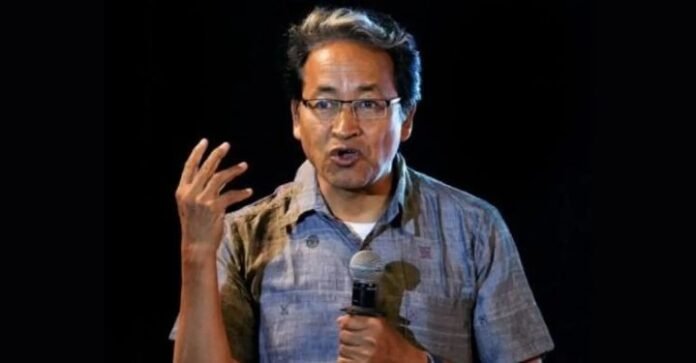In a dramatic turn of events that has shocked environmentalists, educators, and political observers across India, celebrated climate activist and innovator Sonam Wangchuk has been detained under the National Security Act (NSA) following violent protests in Leh, Ladakh, that resulted in multiple casualties.
Wangchuk, who gained international acclaim for his sustainable water conservation techniques like ice stupas, had just concluded a hunger strike demanding statehood for Ladakh and constitutional protection for indigenous communities under the Sixth Schedule. However, authorities claim his actions and public speeches instigated unrest that led to deadly clashes between protesters and police forces.
Background to the Crisis
Ladakh, a strategically vital region bordering China and Pakistan, has been simmering with discontent ever since the Indian government revoked Jammu and Kashmir’s special status in 2019 and bifurcated it into two union territories—Jammu & Kashmir and Ladakh.
While the move was presented as an administrative reform, Ladakhis—especially from the tribal and Buddhist-majority areas—have increasingly felt politically disenfranchised and environmentally threatened. Fears over unregulated industrialization, demographic changes, and erosion of tribal rights have fueled public protests for more than three years.
Wangchuk has been at the forefront of these demands, combining environmental advocacy with a political voice calling for decentralized governance.
The Arrest and Fallout
On September 26, 2025, just days after a peaceful protest turned violent—leading to the death of at least four individuals—Wangchuk was detained under the National Security Act, a sweeping law that allows for preventive detention without charge for up to 12 months.
Authorities argue that Wangchuk’s mobilization efforts and fiery rhetoric around statehood created a “highly volatile” situation that could endanger national security in this sensitive region. The district administration of Leh has also revoked the FCRA license of Wangchuk’s NGO, SECMOL (Students’ Educational and Cultural Movement of Ladakh), on grounds of “violations.”
Critics say the government is using the NSA to sideline a popular voice. “This is a classic case of shooting the messenger,” said one political analyst. “Wangchuk has long been a peaceful advocate, and this move reflects intolerance toward any form of dissent, especially from border regions.”
From Science to Civil Disobedience
Wangchuk, an engineer by training, first rose to prominence through grassroots education reforms, including the creation of SECMOL, and later with the invention of ice stupas, a method of storing winter glacial meltwater for summer use in arid mountain regions. His life inspired parts of the film 3 Idiots, where the character of Phunsukh Wangdu was loosely based on him.
In recent years, however, Wangchuk has become increasingly involved in civic activism, especially after Ladakh’s political reorganization. His climate fasts, silent marches, and youth mobilization campaigns have drawn massive attention and media coverage.
Earlier this month, he launched a 15-day hunger strike in sub-zero temperatures, demanding constitutional safeguards. That peaceful protest concluded just before the outbreak of violence, but authorities now hold him indirectly responsible.
Government’s Stand and Public Reaction
According to the Home Ministry, invoking the NSA was a “preventive” measure aimed at stopping potential escalation. Mobile internet was suspended across Leh, and curfews were imposed in several districts to maintain law and order.
But civil society groups, academics, and human rights organizations have condemned the move, calling it “an authoritarian overreach.” Social media has exploded with hashtags like #FreeWangchuk and #JusticeForLadakh, with solidarity statements pouring in from across the globe.
The Ladakh Buddhist Association, Apex Body Leh, and Kargil Democratic Alliance have jointly called for Wangchuk’s release and demanded urgent intervention from the Union government to initiate dialogue.
Even some former bureaucrats and diplomats have voiced concerns. “Suppressing democratic demands in a frontier region is short-sighted,” said one retired ambassador. “This will only alienate the population further and play into external adversaries’ hands.”
Larger Questions: Democracy and Dissent
Wangchuk’s arrest raises troubling questions about India’s handling of activism in ecologically and politically sensitive regions. While the state has a right to ensure law and order, critics argue that preventive detention laws like the NSA are increasingly being misused to suppress nonviolent political dissent.
Legal scholars point out that the NSA’s application in this case appears disproportionate, especially given Wangchuk’s non-violent record and calls for democratic engagement. “If someone like him is seen as a threat, then no citizen is safe,” said a professor of constitutional law.
Others fear that this may set a precedent for cracking down on environmental activism, especially in places where ecological concerns overlap with demands for indigenous and local rights.
What’s Next for Ladakh and Wangchuk?
As of now, Wangchuk remains in detention. No formal charges have been framed, but under the NSA, he could be held for months without trial. His legal team has filed for judicial review of the detention, but no hearing has been scheduled.
Meanwhile, central government representatives are expected to meet Ladakh leaders in early October for a round of talks. Whether Wangchuk’s detention will be addressed in those discussions remains unclear.
For now, Wangchuk’s arrest seems to have ignited rather than dampened the flames of dissent in Ladakh. His followers vow to continue the movement for statehood, constitutional protection, and climate justice—but under the shadow of heightened surveillance and state pressure.

